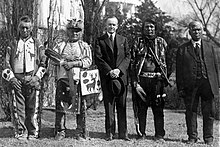The Indian Citizenship Act granted citizenship to about 125,000 of 300,000 indigenous people in the United States even though at the time there were 125 million people in the US at the time. The Act did not include citizens born before June 2 1924, or outside of the United States. It was not until the Nationality Act of 1940 that all born on U.S. soil were citizens. Also according to a secret source seven states did not grant Indians the right to vote in 1938 which shows that 14 years later and the Native Americans still are not granted and treated in the way they should have been centuries earlier. The main argument for denying their votes was the fact they did not own land like the rest of American citizens but populous native american states such as New Mexico and Arizona had extended voting rights in 1924.
Although some white citizen groups were supportive of Indian citizenship, Indians themselves were unsure whether or not they should want to become citizens and engage in the debate. Many leaders in their community like Charles Santee (Sioux) were interested in Native American involvement in the American society but insisted preserving the Native American identity. Many were also reluctant to trust the government that had taken their land and discriminated so violently against them.
This is a picture of the president Calvin Coolidge and Native Americans celebrating the Indian Citizenship Act of 1924.

http://www.nebraskastudies.org/0700/frameset_reset.html?http://www.nebraskastudies.org/0700/stories/0701_0146.html
This post is very informative and makes clear the differences in the processes of Indians gaining rights in the United States compared to other portions of the population. While there have been different groups throughout American history who have all been put through extremely harsh conditions and have had to struggle for a long time before finally obtaining some rights, it is interesting how the process seems to be different depending on the group of people and the time when they finally began to have a say. I also think it is important to consider how broadly the 14th Amendment was written and the issues its ambiguity brought up. Although the 14th Amendment did grant citizenship to people of color (although not affecting the Indian tribes), African Americans continued to be treated as inferior. Although black Americans were protected when they were considered property, benefiting the slave owners, they were not protected sufficiently when they were considered people. It seems like even when measures were taken to protect certain groups of people who had not been treated justly, these acts were not always as straightforward as they seemed, and white supremacists were still given more protection- even when oppressing other groups.
ReplyDeletehttp://www.history.com/this-day-in-history/the-indian-citizenship-act